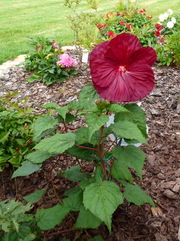Hibiscus moscheutos
| Hibiscus moscheutos subsp. var. | ||||||||||||||||||||||||||||||||||||||||||||||||||||||||
|---|---|---|---|---|---|---|---|---|---|---|---|---|---|---|---|---|---|---|---|---|---|---|---|---|---|---|---|---|---|---|---|---|---|---|---|---|---|---|---|---|---|---|---|---|---|---|---|---|---|---|---|---|---|---|---|---|

|
|
| ||||||||||||||||||||||||||||||||||||||||||||||||||||||
| ||||||||||||||||||||||||||||||||||||||||||||||||||||||||
Popular, showy garden plant.
| Standard Cyclopedia of Horticulture |
|---|
|
Hibiscus moscheutos, Linn. (H. palustris, Linn.). Swamp Rose- Mallow. Strong-growing perennial 3-8 ft., the terete st. pubescent or tomentose: lvs. mostly ovate, entire in general outline or sometimes shallowly 3-lobed at the top, crenate-toothed, very soft-tomentose beneath but becoming nearly or quite glabrous above, the long petiole often joined to the peduncle: bracteoles linear, nearly or quite as long as the tomentose calyx: calyx- lobes triangular-ovate; fls. very large (4-7-8 in. broad), light rose-color: caps, globose-ovoid, glabrous. Marshes along the coast from Mass, to Fla. and west to Lake Michigan. B.M. 882. B.R. 1463; 33:7. Mn. 2:161. Gng. 2:227. F.S. 12:1233. R.H. 1907, p. 203 (as var. palustris). G.W. 6, p. 63. H. roseus, Thore, of Europe, is considered to be a naturalized form of this American species. R.H. 1879:10.—One of the best of the rose-mallows, thriving in any good garden soil. Of easiest cult, and perfectly hardy. Blooms in Aug. and Sept. The foliage is strong and effective. The most generally cult, of the hardy herbaceous kinds.
|
Cultivation
Propagation
Seed, division, cuttings.
Pests and diseases
Species
Gallery
If you have a photo of this plant, please upload it! Plus, there may be other photos available for you to add.
-
photo 1
-
photo 2
-
photo 3
References
- Standard Cyclopedia of Horticulture, by L. H. Bailey, MacMillan Co., 1963
External links
- w:Hibiscus moscheutos. Some of the material on this page may be from Wikipedia, under the Creative Commons license.
- Hibiscus moscheutos QR Code (Size 50, 100, 200, 500)
